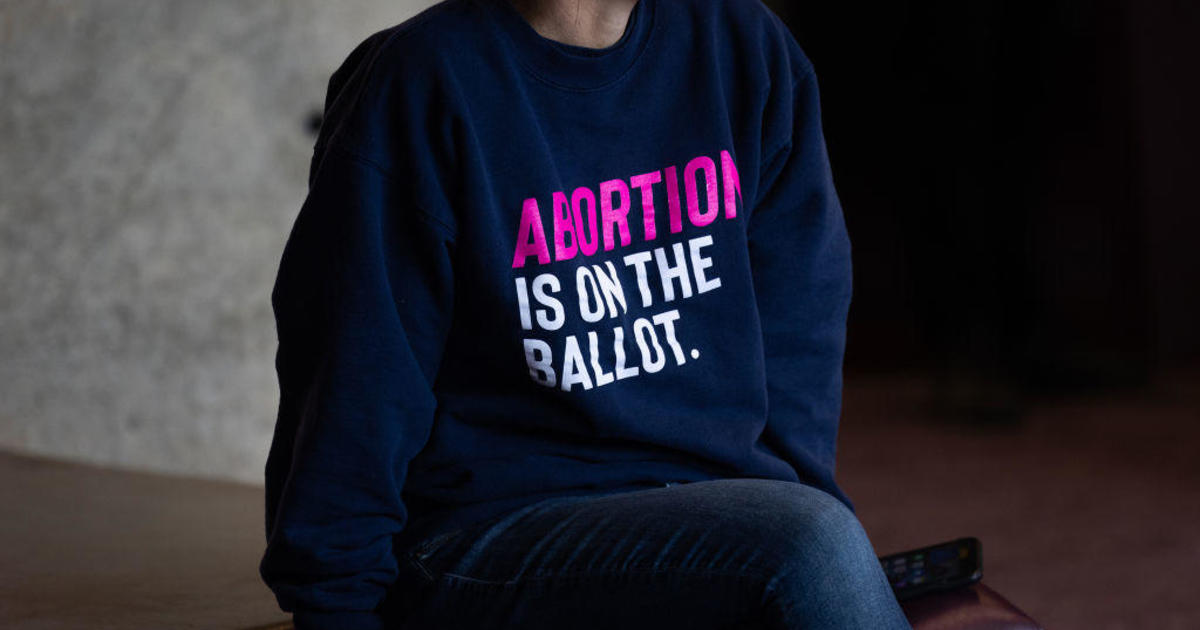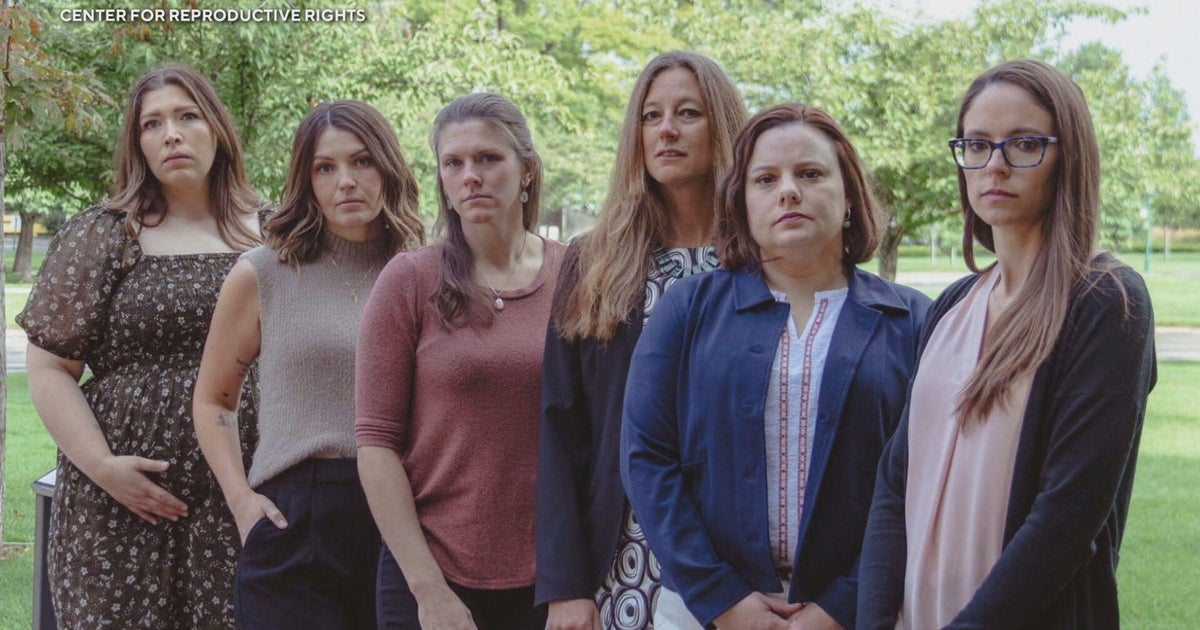CBS News
Restrictive abortion laws disproportionately impact Black women in GOP-led states, new Democratic memo notes

The Democratic Legislative Campaign Committee, the campaign arm that helps elect Democrats to state legislatures, is circulating a new memo in order to highlight what it says is the disproportionate impact of abortion bans on Black women in GOP-led states. Such bans provoke strong emotional responses from Democratic Black women state lawmakers — sadness, distress, but not surprise.
“It is sad, but it is not surprising. You know, the abortion bans — and certainly since the fall of Roe — have really jeopardized the health of women in general,” New York Senate President Pro Tempore Andrea Stewart-Cousins, a Democrat, told CBS News. “And because the Black maternal mortality rates are already alarmingly high, nationally, these bans have only exacerbated the overall reproductive health problems that Black women face. So it’s sad. It’s terribly disappointing.”
Black women have the highest abortion rate in the U.S., according to the most recent data from the Centers for Disease Control and Prevention.
Abortion restrictions that have gone into effect across the U.S. since the Supreme Court ended federal protections for the procedure have only exacerbated previously existing socioeconomic disparities, abortion access advocates say.
“Even before the Supreme Court overturned Roe, Black and Brown people were bearing the brunt of abortion restrictions. Abortion coverage bans like the Hyde Amendment fall hardest on Black and Latinx people, who are more likely to be enrolled in Medicaid,” said Nourbese Flint, president of All* Above All, a group that works to ensure abortion access. The Hyde Amendment, named for its sponsor, the late Illinois GOP Rep. Henry Hyde, blocks federal funds from being used for abortions except in cases of rape, incest or if the mother’s life is in danger.
Julia Nikhinson/Bloomberg via Getty Images
According to research compiled by the DLCC, the Black maternal mortality rate is significantly higher in Republican-led states with restrictive abortion bans.
For instance, in Florida, where abortion is banned at 15 weeks, Black women are nearly four times as likely to die from complications related to pregnancy, compared to White women, the DLCC noted, citing data compiled by the Florida Department of Health. In Georgia, where a six-week abortion ban is in place, Black women “are more than three times more likely to die from pregnancy complications than white women, the worst ratio in the country,” the DLCC said in its memo.
Heather Williams, the president of the DLCC, said in a statement, “Republicans’ crusade against reproductive freedoms is costing lives —- especially in Black communities. The fall of Roe has compounded the impacts of medical discrimination by opening the floodgates for conservative legislators to pass sweeping abortion bans, which disproportionately impact Black women.”
Dr. Ingrid Skop is vice president and director of Medical Affairs for Charlotte Lozier Institute, which is the research arm of Susan B. Anthony Pro-Life America. She rejected the idea that enabling Black women to have greater access to abortion would reduce Black maternal mortality.
“If more abortions mean better maternal mortality outcomes, then black women, who see the highest abortion rates in the U.S., wouldn’t have the highest maternal mortality rate,” Skop said in a statement to CBS News. “Maternal mortality is a complex, tragic issue that requires thoughtful solutions. Demonizing pro-life protections to promote more abortions is not the answer.”
In Georgia, the GOP-led legislature is trying to address the issue. Republican state Rep. Lauren Daniel sponsored a bill this year that would create a commission on maternal and infant health.
In January, Daniel said in a statement, “Over the last decade, there have been numerous efforts made in the legislature to address maternal mortality in Georgia. However, nationwide, we have seen a rise in maternal health issues such as heart disease, cardiomyopathy, pre-eclampsia, embolism, gestational diabetes and maternal mental health conditions; many of these also lead to consequential health issues in infants.”
The Biden administration has sought to position itself as a staunch advocate for abortion rights, and maternal mortality is a part of that argument. Kamala Harris, the first woman and Black person to be elected vice president is helming the abortion access fight, and she often highlights the impact restrictive abortion bans have had on Black women.
Julia Nikhinson/Bloomberg via Getty Images
“While these extremists behind these laws say they are motivated by the health and well-being of women and children, while they say that, they have been silent on the crisis of maternal mortality,” she said recently in Savannah during the reelection campaign’s Reproductive Freedoms Tour. She added that “the top ten states with the highest rates of maternal mortality all have abortion bans.”
Harris was integral in launching the White House Blueprint for Addressing the Maternal Health Crisis, which also seeks to highlight the disproportionate rate of maternal mortality faced by Black women. She has also attempted to amplify the issue by speaking about it on digital platforms.
In the face of dire statistics, Stewart-Cousins, who is Black, sees a path forward: electing more Democrats.
“We are living in a fact-based world. And the facts are that women are dying and will die, and Black women will die even more — sadly — if we do not allow for women to have the full range of reproductive health care,” Stewart-Cousins said. “And the way we change it is by focusing on outcomes and by providing a greater level of reproductive health care, which apparently only happens when Democrats are in control of the conversation and in control of the policies.”
CBS News
Trump makes more Cabinet picks but some top economic posts remain unfilled

Watch CBS News
Be the first to know
Get browser notifications for breaking news, live events, and exclusive reporting.
CBS News
Open: This is “Face the Nation with Margaret Brennan,” Nov. 24, 2024

Watch CBS News
Be the first to know
Get browser notifications for breaking news, live events, and exclusive reporting.
CBS News
Popular gluten free tortilla strips recalled over possible contamination with wheat

A food company known for popular grocery store condiments has recalled a package of tortilla strips that may be contaminated with wheat, the U.S. Food and Drug Administration said Friday. The product is meant to be gluten-free.
Sugar Foods, a manufacturing and distribution corporation focused mainly on various toppings, artificial sweeteners and snacks, issued the recall for the “Santa Fe Style” version of tortilla strips sold by the brand Fresh Gourmet.
“People who have a wheat allergy or severe sensitivity to wheat run the risk of serious or life-threatening allergic reaction if they consume the product,” said Sugar Foods in an announcement posted by the FDA.
Packages of these tortilla strips with an expiration date as late as June 20, 2025, could contain undeclared wheat, meaning the allergen is not listed as an ingredient on the label. The Fresh Gourmet product is marketed as gluten-free.
Sugar Foods said a customer informed the company on Nov. 19 that packages of the tortilla strips actually contained crispy onions, another Fresh Gourmet product normally sold in a similar container. The brand’s crispy onion product does contain wheat, and that allergen is noted on the label.
U.S. Food and Drug Administration
No illnesses tied to the packaging mistake have been reported, according to the announcement from Sugar Foods. However, the company is still recalling the tortilla strips as a precaution. The contamination issue may have affected products distributed between Sept. 30 and Nov. 11 in 22 states: Arizona, California, Colorado, Florida, Georgia, Iowa, Idaho, Illinois, Indiana, Maryland, Maine, Michigan, Minnesota, North Carolina, New Jersey, Ohio, Oregon, Pennsylvania, Texas, Utah, Virginia and Washington.
Sugar Foods has advised anyone with questions about the recall to contact the company’s consumer care department by email or phone.
CBS News reached out to Sugar Foods for more information but did not receive an immediate reply.
This is the latest in a series of food product recalls affected because of contamination issues, although the others involved harmful bacteria. Some recent, high-profile incidents include an E. coli outbreak from organic carrots that killed at least one person in California, and a listeria outbreak that left an infant dead in California and nine people hospitalized across four different states, according to the Center for Disease Control and Prevention. The E. coli outbreak is linked to multiple different food brands while the listeria outbreak stemmed from a line of ready-to-eat meat and poultry products sold by Yu-Shang Foods.











